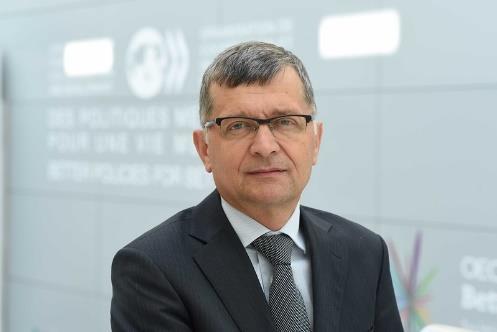
3 minute read
Concluding remarks by Aleksander Surdej Permanent Representative of the Republic of Poland to the OECD
Photo: OECD
OECD Committees in the pursuit of Better Policies for BetterLives
The numerous challenges today’s world is facing require both bilateral and multilateral cooperation among a number of different actors. Lacking provision of global public goods, negative spillovers and systemic effects – to name but three of the most important phenomena – clearly demonstrate that the reality has become multilateral, and that an adequate response to common challenges will likewise need to be multilateral in nature. But multilateral activities rarely happen spontaneously, as all collective actions require a certain degree of institutional facilitation. This may take the form of ad hoc meetings, regular fora, periodic summits or conferences, or else more-formalised cooperation within international organisations. The latter are not an absolute necessity for multilateral cooperation to occur, but without them there is every chance of such cooperation becoming fragile, unstable and most likely far less frequent. There exist many international organisations (IOs) today, and the division of labour among them does not always seem clear and precise. Therefore, a careful re-examination would be needed to design an optimal policy area for each of them. But against this background of IOs, the OECD stands out in terms of its size, mission and outcomes. From the outside, an organisation of 38 Member States might look like an elite club of mostly highly-developed market economies. But the OECD’s focus on maintaining economic openness, while encouraging domestic policies that spread wealth (as summarised in the slogan "Better Policies for Better Lives"), makes it clear that "Better Policies" benefit all countries, prevent detrimental rivalry and – most importantly – are designed to be implemented nationally. This is how the direct and indirect outcomes of the OECD’s work extend far beyond its Members. The OECD Committees can be thought to embody a kind of two-way transmission belt between Member States and the Secretariat. The former interact intensively with the Organisation as a whole, via their Permanent Representations on the one hand (see the previous volume "Inside the OECD: the Ambassadors"), and via their Delegates to Committees on the other. Delegates’ role is to signal outstanding issues in given policy areas that might require research and policy advice, participate in the elaboration of advice of this kind, and support their own countries in contextualising OECD recommendations. By inventing an organisational structure comprising substantive Committees, the OECD’s founding fathers have helped the Organisation to "go national", and its Member States to have a mechanism that serves accelerated policy learning. The interviews brought together in this volume reveal the Committees’ comprehensive internal procedures providing for intermediation between Secretariats and Member States, as well as the status of Committee Chairs as experienced leaders engaging wholeheartedly in the work of these bodies. It is for the Member States to examine whether their own Delegates to each and every OECD body are equipped with the necessary expertise, motivation and administrative position to ensure that OECD-generated knowledge improves domestic policy. And if this volume helps Members optimise delegation to OECD bodies, and the work that Delegates do, then it will have achieved its major objective.
Zbigniew Rau, Minister of Foreign Affairs of the Republic of Poland
The OECD is a unique forum for the exchange of experiences and best practices within the Committees composed of the Delegates from Member States supported by the Secretariat. The role of OECD Committee Chairs is essential for the development of norms and standards, elaborating relevant recommendations and conducting the peer reviews.
Mathias Cormann, Secretary-General of the OECD
The OECD’s Committee structure is part of our "DNA". It is unique among international organisations, incorporating around 300 bodies in total and covering an expansive range of topics from improving economic performance and creating jobs to fostering strong education, tackling inequality and youth unemployment and fighting international tax evasion.
Aleksander Surdej, Permanent Representative of the Republic of Poland to the OECD The OECD Committees can be thought to embody a kind of two-way transmission belt between Member States and the Secretariat. The former interact intensively with the Organisation as a whole, via their Permanent Representations on the one hand (see the previous volume "Inside the OECD: the Ambassadors"), and via their Delegates to Committees on the other.







